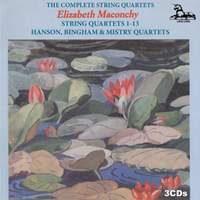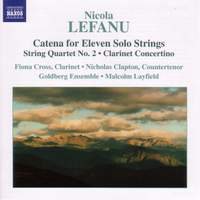Originally posted by Bryn
View Post
Women composers
Collapse
X
-
When Steve Reich brought Drumming to the Arnolfini in Bristol in '72, the continuous two hours (was it?) in silence was an extraordinary experience, and not in any way boring. I think that in two ways it, and other works conceived along the same principles, was an end in itself, and self-sufficient - and I imagine Reich would have regarded it no differently. I remember David Bedford - himself not immune to the Reich Factor - saying that with Minimalism one anticipated the Big Tune that never came accompanying the famous Western hero on horseback coming over the hill. A number of us predicted that Reich would strike out in a different direction.Originally posted by cloughie View PostI’d rather not think of Steve Reich at all.
Comment
-
-
Indeed, Drumming was effectively the culmination of his 'phase' period. By Music for 18 Musicians, new compositional procedures were employed. I don't buy the 'waiting for the big tune' concept. What's the final section of Drumming, with its piccolos and wide-ranging percussion timbres, if not 'the big tune'?Originally posted by Serial_Apologist View PostWhen Steve Reich brought Drumming to the Arnolfini in Bristol in '72, the continuous two hours (was it?) in silence was an extraordinary experience, and not in any way boring. I think that in two ways it, and other works conceived along the same principles, was an end in itself, and self-sufficient - and I imagine Reich would have regarded it no differently. I remember David Bedford - himself not immune to the Reich Factor - saying that with Minimalism one anticipated the Big Tune that never came accompanying the famous Western hero on horseback coming over the hill. A number of us predicted that Reich would strike out in a different direction.
Comment
-
-
Yes, apologies - that was my slipshod way of talking about some of the later developments in the genre which made greater use of harmonic anticipation and cadential postponement.Originally posted by Bryn View PostIndeed, Drumming was effectively the culmination of his 'phase' period. By Music for 18 Musicians, new compositional procedures were employed. I don't buy the 'waiting for the big tune' concept. What's the final section of Drumming, with its piccolos and wide-ranging percussion timbres, if not 'the big tune'?
Comment
-
-
As big a fan as I am of BBC Radio 3, and as much as I would like to praise their efforts on behalf of neglected British women composers, it has to be said that you could draw a pretty damning graph comparing the attention given to the challenge of the idiom. Extremely conservative composers such as Ruth Gipps and Susan Spain-Dunk get the bulk of the airtime, a Middle Modernist such as Elizabeth Maconchy significantly less, and more avant-garde composers such as Priaulx Rainier (1903-86) and Elisabeth Lutyens (1906-83) virtually none at all. I doubt this would have surprised Rainier and Lutyens, who were friends; the latter was feisty on a host of subjects, including whom the establishment did and didn’t favor, and semi-famously dismissed pastoral composers with their “folky-wolky melodies on the cor anglais”.
I’m not saying that composers such as Gipps and Spain-Dunk should be ignored, far from it, but I have to wonder how announcers at Radio 3 feel about this obvious imbalance? Doesn’t it amount to saying that if women are polite and don’t make trouble, they too can have a place at the table?
Comment
-
-
It has been mentioned in other posts - usually when Lutyens and Maconchy get a (rare ) outing at the Proms. The archive of past Prom performances indicates the scale of their fall from favour - often to be replaced by distinctly inferior successors and , less explicably , contemporaries.Originally posted by PatrickMurtha View PostAs big a fan as I am of BBC Radio 3, and as much as I would like to praise their efforts on behalf of neglected British women composers, it has to be said that you could draw a pretty damning graph comparing the attention given to the challenge of the idiom. Extremely conservative composers such as Ruth Gipps and Susan Spain-Dunk get the bulk of the airtime, a Middle Modernist such as Elizabeth Maconchy significantly less, and more avant-garde composers such as Priaulx Rainier (1903-86) and Elisabeth Lutyens (1906-83) virtually none at all. I doubt this would have surprised Rainier and Lutyens, who were friends; the latter was feisty on a host of subjects, including whom the establishment did and didn’t favor, and semi-famously dismissed pastoral composers with their “folky-wolky melodies on the cor anglais”.
I’m not saying that composers such as Gipps and Spain-Dunk should be ignored, far from it, but I have to wonder how announcers at Radio 3 feel about this obvious imbalance? Doesn’t it amount to saying that if women are polite and don’t make trouble, they too can have a place at the table?
Comment
-
-
It is too bad. I am always impressed when I hear an unfamiliar Maconchy piece, and I would like to become more familiar with Lutyens and Rainier.Originally posted by Ein Heldenleben View Post
It has been mentioned in other posts - usually when Lutyens and Maconchy get a (rare ) outing at the Proms. The archive of past Prom performances indicates the scale of their fall from favour - often to be replaced by distinctly inferior successors and , less explicably , contemporaries.
Comment
-
-
I assume that you know the Maconchy string quartets, a fairly recent discovery for me:Originally posted by PatrickMurtha View Post
It is too bad. I am always impressed when I hear an unfamiliar Maconchy piece, and I would like to become more familiar with Lutyens and Rainier.
Elizabeth Maconchy: Complete String Quartets. Unicorn: DKPCD9080-2. Buy 3 CDs online. Hanson String Quartet, Bingham String Quartet, Mistry Quartet
Comment
-
-
I know Nos. 2 and 3, and was quite impressed by them. I think there are 13 in all? There are a lot of (lengthy) string quartet series that get overlooked.Originally posted by Pulcinella View Post
Comment
-
-
Yes, 13.Originally posted by PatrickMurtha View Post
I know Nos. 2 and 3, and was quite impressed by them. I think there are 13 in all? There are a lot of (lengthy) string quartet series that get overlooked.
I'm just listening now to a CD of music by her daughter, Nicola LeFanu, who was/is still? a professor here in York.
LeFanu: Catena for 11 solo strings, etc.. Naxos: 8557389. Buy download online. Fiona Cross (clarinet), Nicholas Clapton (countertenor) Goldberg Ensemble, Malcolm Layfield
Comment
-
-
The great Grazyna Bacewicz has seven string quartets, of which I’ve heard Nos. 1 and 5.Originally posted by Pulcinella View Post
A few other of the lengthy quartet series I referred to: Alois Hába (16), Vagn Holmboe (21, I think), Gian Francesco Malipiero (8), Darius Milhaud (18), Quincy Porter (9), Robert Simpson (15), Sergei Taneyev (11, I think), Sulkan Tsintsadze (12), Heitor Villa-Lobos (17), Mieczyslaw Weinberg (17), Egon Wellesz (9). But that is a smattering.
Comment
-
-
I didn't know this thread existed until now . I've been virtually beaten about the head for my views on women composers. I echo Patrick's plea for more broadcasts of Rainier and Lutyens, who along with Carwithen and Williams are in my view the ones whose music deserves more attention. But I'm afraid I have little time for the current crop of women composers whose music is much favoured by Radio 3: Judith Weir, Judith Bingham, Cecilia MacDowall , Cheryl Frances-Hoad and others. I've tried hard to give their music a fair hearing but always feel I've been wasting my time. They undoubtedly know a lot about composing , and they're very professional, but I find their music intolerably dull and bland. I should add in fairmess that I think this about some highly-praised male composers too, such as George Benjamin and Thomas Ades.
One thing I deplore, as it shows no sign of going away, is the repeated fallacy that women composers' music is or was neglected solely because they were women. Apart from failing to explain the huge success of Judith Weir and others, it ignores the simple fact that music is ignored or neglected for a host of reasons: the composer was writing out of fashion, or lacked the social skills to engage the attention of concert promoters, or wasn't lucky enough to attract a champion. There are dozens of neglected male composers who wrote splendid music .
Comment
-
-
I agree with you here. Many of the newer “professional” composers, as you well put it, both female and male, have failed to register much with me. My inner jury is still out on Benjamin and Adès, although there are pieces I have liked. I do think James MacMillan is extraordinary.Originally posted by smittims View PostI didn't know this thread existed until now . I've been virtually beaten about the head for my views on women composers. I echo Patrick's plea for more broadcasts of Rainier and Lutyens, who along with Carwithen and Williams are in my view the ones whose music deserves more attention. But I'm afraid I have little time for the current crop of women composers whose music is much favoured by Radio 3: Judith Weir, Judith Bingham, Cecilia MacDowall , Cheryl Frances-Hoad and others. I've tried hard to give their music a fair hearing but always feel I've been wasting my time. They undoubtedly know a lot about composing , and they're very professional, but I find their music intolerably dull and bland. I should add in fairmess that I think this about some highly-praised male composers too, such as George Benjamin and Thomas Ades.
One thing I deplore, as it shows no sign of going away, is the repeated fallacy that women composers' music is or was neglected solely because they were women. Apart from failing to explain the huge success of Judith Weir and others, it ignores the simple fact that music is ignored or neglected for a host of reasons: the composer was writing out of fashion, or lacked the social skills to engage the attention of concert promoters, or wasn't lucky enough to attract a champion. There are dozens of neglected male composers who wrote splendid music .
Grazyna Bacewicz and Dora Pejacevic are right up my alley, excellent composers who are akin to those “dozens of neglected male composers” that you mention. But then I am all about lesser-known names and 20th Century “Middle Modernists”.
At least Radio 3 plays British composers. The many fine composers of the mid-20th Century “American Symphony School” - Schuman, Piston, Diamond, there are dozens - are never programmed in the US now because they are white males and it just wouldn’t do. The superb George Walker has escaped this neglect just a bit because he was African-American, and I am glad to see it, but all those other guys were his peer group and deserve revival, too.
Last edited by PatrickMurtha; 07-11-23, 19:01.
Comment
-


Comment